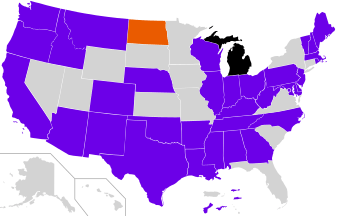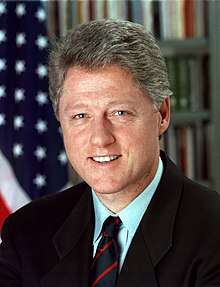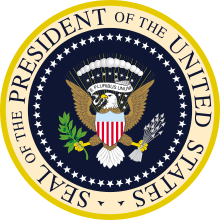1996 Democratic Party presidential primaries
The 1996 Democratic presidential primaries were the selection process by which voters of the Democratic Party chose its nominee for President of the United States in the 1996 U.S. presidential election. Incumbent President Bill Clinton was again selected as the nominee through a series of primary elections and caucuses culminating in the 1996 Democratic National Convention held from August 26 to August 29, 1996, in Chicago, Illinois.
| |||||||||||||||||||||||||||||||||||||||||
| |||||||||||||||||||||||||||||||||||||||||

| |||||||||||||||||||||||||||||||||||||||||
| |||||||||||||||||||||||||||||||||||||||||
Primary race overview
With the advantage of incumbency, Bill Clinton's path to renomination by the Democratic Party was uneventful. At the 1996 Democratic National Convention, Clinton - along with incumbent Vice President Al Gore - was renominated following a primary race in which he faced only token opposition. Perennial candidate Lyndon LaRouche qualified for one delegate from Virginia and one delegate from Louisiana, but the state parties refused to award him delegates and the First District Court of Appeals upheld their decision.[1] Former Pennsylvania governor Bob Casey contemplated a challenge to Clinton, but health problems forced Casey to abandon a bid.[2][3] That left Jimmy Griffin, the former mayor of Buffalo, New York, as the highest-ranking challenger still in the race. After finishing in eighth place, behind even the perennial candidates, in the New Hampshire primaries, Griffin dropped out of the race. Clinton easily won primaries nationwide, with margins consistently higher than 80%.[4]
Roland Riemers scored a victory in North Dakota, a state where Clinton did not file to appear on the ballot.[5][6]
Backed by a loyal following, LaRouche managed to get on the ballot in most states and amassed over half a million votes nationwide in the primary. His highest percentage was 13.4% in West Virginia and received over a hundred thousand votes in California.
Another notable campaign besides LaRouche's to challenge the President was Chicago housewife Elvena Lloyd-Duffie, who was reported to have outraised the President at one point[7] and got as high as 11% of the vote in Oklahoma.[8] and 7% in Louisiana.
Candidates
Nominee
| Candidate | Most recent position | Home state | Campaign | Popular
vote |
Contests won | Running mate | ||
|---|---|---|---|---|---|---|---|---|
| Bill Clinton |  |
President of the United States
(1993-2001) |
 |
(Campaign) |
9,706,802
(89.0%) |
34 |
Al Gore | |
Withdrew during primaries
- Activist Lyndon LaRouche from Virginia
- Former Mayor of Buffalo Jimmy Griffin from New York
Results
With a number of non-notable people running against Clinton and LaRouche in several states, The nationwide totals went as follows[9]:
| Candidate | total popular vote | Contests won |
|---|---|---|
| Bill Clinton | 9,706,802 (88.94%) | 34 |
| Lyndon H. LaRouche, Jr. | 596,422 (5.47%) | |
| Uncommitted | 411,270 (3.77%) | 1 |
| Elvena E. Lloyd-Duffie | 92,324 (0.85%) | |
| Fred Hudson | 32,232 (0.30%) | |
| Heather Anne Harder | 29,147 (0.27%) | |
| Ted Gunderson | 15,712 (0.14%) | |
| Sal Casamassima | 9,693 (0.08%) | |
| Ralph Nader† | 6,786 (0.06%) | |
| Pat Buchanan† | 3,362 (0.03%) | |
| Lamar Alexander† | 1,888 (0.02%) | |
| Pat Paulsen | 1,317 (0.01%) | |
| Steve Forbes† | 1,297 (0.01%) | |
| Robert J. Dole† | 1,257 (0.01%) | |
| Al Gore† | 679 (0.006%) | |
| Carmen C. Chimento | 656 (0.006%) | |
| Roland Riemers | 651 (0.006%) | 1 |
| Richard Lugar† | 410 (0.004%) | |
| Vernon Clemenson | 384 (0.004%) | |
| Bruce C. Daniels | 312 (0.003%) | |
| James D. Griffin | 307 (0.003%) | |
| Alan L. Keyes† | 281 (0.003%) | |
| Colin Powell† | 280 (0.003%) | |
| Steve Michael | 94 (0.0008%) | |
| Willie Felix Carter | 85 (0.0008%) | |
| Robert D. Rucker | 81 (0.0007%) | |
| David S. Pauling | 74 (0.0007%) | |
| Vincent S. Hamm | 72 (0.0007%) | |
| Frank Legas | 63 (0.0006%) | |
| Ronald Spangler | 62 (0.0006%) | |
| Michael E. Dass | 57 (0.0005%) | |
| Ben J. Tomeo | 47 (0.0004%) | |
| John Safran | 42 (0.0004%) | |
| Total | 10,914,146 | 36 |
† Indicates a write-in candidate
See also
- Republican Party presidential primaries, 1996
References
- LaRouche v. Fowler. United States Court of Appeals, District of Columbia Circuit. 2008-08-28
- "Anyone left? The search for a Clinton challenger in 1996". The Progressive. TheFreeLibrary.com. May 1, 1995. Retrieved December 6, 2010.
- Newton-Small, Jay (November 24, 2009). "Can a Pro-Life Dem Bridge the Health-Care Divide?". Time. Retrieved December 6, 2010.
- US President - D Primaries. OurCampaigns.
- Winger, Richard. "Ballot Access News -- March 6, 1996". Ballot Access News. Retrieved 11 March 2020.
- FEC: 1996 Presidential Primary Results
- https://www.washingtonpost.com/news/the-fix/wp/2015/12/18/lqeither-a-woman-youve-never-heard-of-outraised-bill-clinton-in-1996-or-campaign-finance-reports-are-murky/
- https://transition.fec.gov/pubrec/fe1996/presprim.htm
- https://www.ourcampaigns.com/RaceDetail.html?RaceID=55214&ShowAllCand=Y


.jpg)
